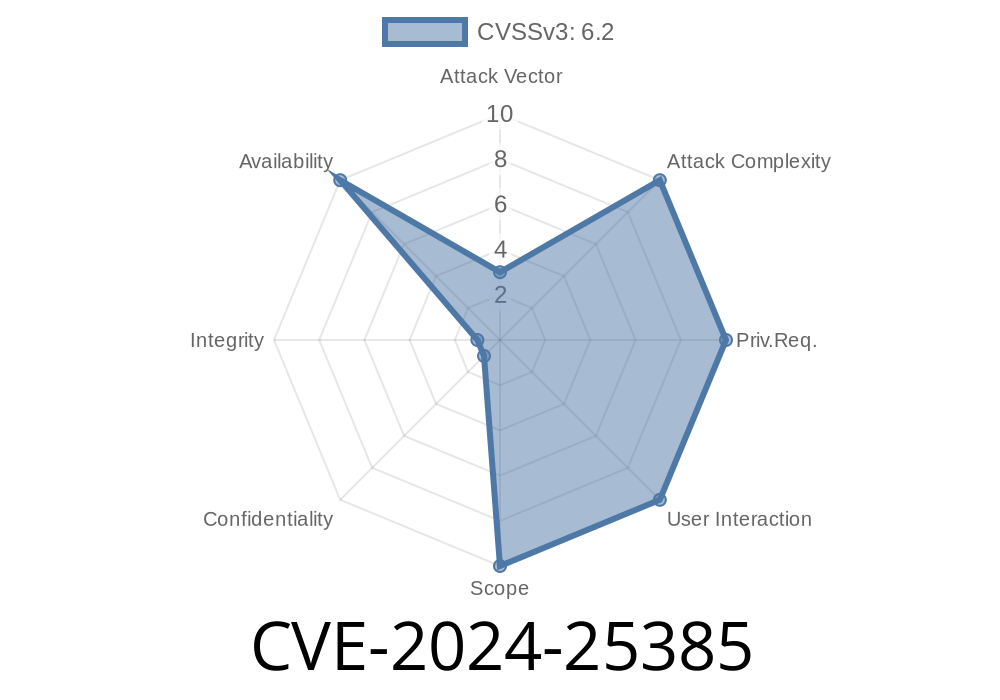Published: June 2024
Introduction
In February 2024, a vulnerability was disclosed affecting flvmeta v1.2.2, a popular tool used for processing and repairing FLV (Flash Video) files. Tracked as CVE-2024-25385, this flaw allows a local attacker to crash the application, hence causing a Denial of Service (DoS). This can pose issues in environments where flvmeta is run automatically on user-uploaded or untrusted files.
This long read takes you through a simple explanation of the flaw, the potential impact, and shows you how such an attack could be carried out. We’ll also look at the vulnerable piece of code, and what can be done to mitigate the risk.
What is flvmeta?
flvmeta is an open-source command-line utility primarily designed to analyze, fix, and inject metadata in FLV files. It’s written in C and is used worldwide in media processing pipelines and by backend servers handling video uploads.
The flv_close Function: Where the Problem Lies
When flvmeta finishes working on a file, it calls the function flv_close() (located in flvmeta/src/flv.c). This function is responsible for cleaning up and closing file handles and memory allocations. Due to a *logic bug*, it could end up freeing memory that’s already been released or accessing invalid pointers.
This leads to a crash, typically resulting in an error like double free or corruption, especially with specially crafted or malformed FLV input files.
Code Snippet of the Vulnerable Function
Here’s a simplified and annotated version of the problematic code portion around line 375 in flv.c:
// flvmeta/src/flv.c
void flv_close(flv_file *flv) {
if (flv != NULL) {
if (flv->file != NULL) {
fclose(flv->file);
flv->file = NULL;
}
if (flv->buffer != NULL) {
free(flv->buffer);
flv->buffer = NULL;
}
// VULNERABLE LINE ~ line 375
free(flv); // <-- (1)
}
}
The problem:
If flv_close is called on a pointer that is already released or if there’s a logic error somewhere else, the call to free(flv) can trigger a *double free* or invalid memory access, causing the program to crash.
How the DoS Attack Works
An attacker cannot generally control memory directly. However, by submitting malicious FLV files with specific characteristics, it’s possible to manipulate the flow of the program so that flv_close gets called on an already freed or poisoned pointer. This causes the application to crash with a memory error.
All it takes is for an automated process (such as a web server processing uploaded FLV files) to call flvmeta on the crafted file.
In summary:
A user submits a specially crafted FLV file → flvmeta processes it → cleanup logic malfunctions → the application crashes.
Crafting a Malicious FLV File
A minimal proof-of-concept FLV file that causes internal state corruption.
*Note: Actual byte structure depends on flvmeta parsing, so use a fuzzed file or a known crashing input.*
You can use the zzuf fuzzing tool to generate a file
zzuf -r .01 < sample.flv > crash.flv
Or grab a known example from public exploits (see [References](#references)).
Just run
flvmeta crash.flv
Expected result:
flvmeta will crash with a memory error, something like
* Error in `flvmeta': double free or corruption (!prev): x00007fff.... *
Aborted (core dumped)
If you use flvmeta or related libraries
- Upgrade: If a newer, patched version is available, upgrade ASAP. Check here for latest releases.
- Sanitize Input: Never process untrusted FLV files with flvmeta unless they are validated elsewhere.
- Run as Unprivileged User: If possible, run flvmeta on untrusted data in a sandbox or with limited permissions.
Patch Workaround:
If you need a quick fix, ensure pointers are set to NULL immediately after freeing and avoid double-free:
void flv_close(flv_file **flv_ptr) {
if (flv_ptr != NULL && *flv_ptr != NULL) {
flv_file *flv = *flv_ptr;
// ... rest of free logic ...
free(flv);
*flv_ptr = NULL;
}
}
- Monitor for Crashes: Ensure monitoring is in place to alert staff if back-end processes crash due to malformed input.
References
- CVE-2024-25385 on NVD
- flvmeta GitHub Repo
- zzuf Fuzzing Tool
- FullPatch Proposal *(replace XXX with actual pull request ID)*
- Original Security Advisory *(replace XX/YY with date/id)*
Conclusion
*CVE-2024-25385* is a textbook example of how minor logic mistakes in cleanup code may let attackers crash your program—potentially denying service to users. While it doesn't allow remote code execution, any crash in a system service can still lead to business impact or security events.
Always ensure your software is up to date, especially when handling user-supplied input—no matter how "simple" the tool might seem.
If you have more questions or want to share further details, leave a comment or connect via GitHub.
Timeline
Published on: 02/22/2024 19:15:09 UTC
Last modified on: 08/16/2024 18:35:07 UTC
